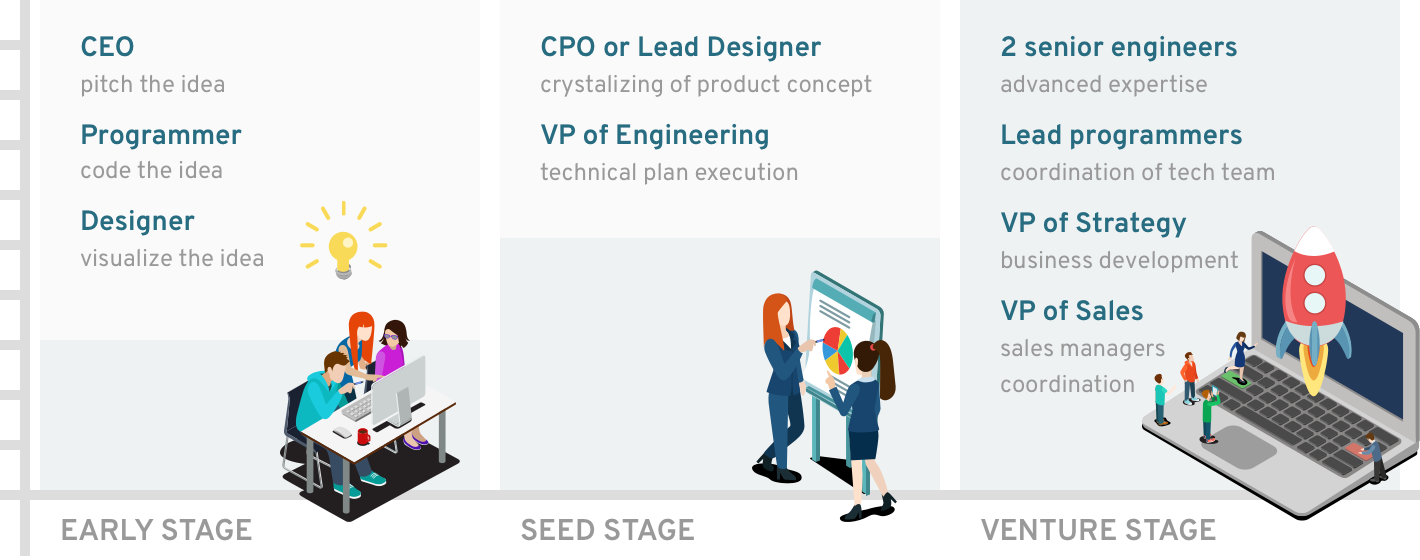How to Build the Perfect Startup Team? What Should You Do?
Head of Marketing at TechMagic. Passionate about startups, digital ecosystem, cloud technologies, and innovations.

There is one question most founders need answers to when trying to build a startup: “how to build a team for a startup?” The TLDR version is this: there is no guaranteed universal recipe for building the perfect startup team because all businesses are based on people. It’s the
There is one question most founders need answers to when trying to build a startup: “how to build a team for a startup?” The TLDR version is this: there is no guaranteed universal recipe for building the perfect startup team because all businesses are based on people.
It’s the one economic axiom, true even for start-ups. Let’s say you have an awesome idea and a well-established business plan. You need that perfect team to get you rolling on the highway to success. We have news for you! Your quest is doomed to fail!
The truth is that there is no such thing as a perfect start-up team. There is an optimum team for each startup, instead. Take Apple and Steve Jobs, for example. He slept on the floors in his friends’ rooms, left school and had a hell of “not-so-great” personality. Would you hire him today? Probably not. And he was still one of the few people embodying the three essential skills a startup founder or employee must have: developer, designer, and distributor. And even so, Jobs needed more than a quarter of a century to show the world what he was made of.
Before further diving into the problem, let’s take a look at our main focus area: the perfect startup team. It all depends on the stage of your startup. In an article for Forbes, Jeff Wald identified three main stages: the idea, the building phase, and the optimization. A better classification is by funding, and we can identify the early stage, where no revenue is made, the seed stage, where funding is available, and the venture stage.
Following it, we may plan the initial early stage team having a CEO, for pitching the idea and for business purposes, a programmer to code that awesome idea, and a designer. For the seed stage, you might need to add a lead designer or CPO, and an Engineering VP for a better technical plan of action. Finally, for the venture stage, one might need at least two senior engineers and lead programmers, a VP to deal with the business development strategy and, of course, a VP for sales, to coordinate the sales managers.

Everything looks good in theory, but as Kant said, “theory without experience is mere intellectual play”. Let’s take PayPal, for example.
There were two founders, Elon Musk and Peter Thiel. What happened to the original team? They created the so-called “PayPal Mafia”. The merger of Musk and Thiel’s ideas had so much success that it later determined an efflux of former employees and founders who started successful tech companies.
Do Tesla Motors, SpaceX, YouTube, LinkedIn or Yelp sound familiar? They’re the works of Musk, Steve Chen, Jawed Karim, Chad Hurley, Reid Hoffman, and Russel Simmons. They all had one thing in common – one initial successful start-up team, which acted as a framework for modelling their ideas and behaviours later on.
So how exactly would you build your startup team?
Is there a shortcut? Well, it is. As Rei Inamoto, the chief creative officer for AKQA, said, “to run an efficient team, you only need three people: a hipster, a hacker, and a hustler”. Andy Ellwood explains the concept very well. The hipster is responsible with the creative part, design, and that cool factor, the hacker gets things done, technologically speaking, and the hustler packages all these and brings it for sale to the public.
Reading between the lines, you should not focus so much on the technical aspect of finding talent when trying to assemble a start-up team. Look for the risk aspect, for those potential employees or collaborators able to lower the risk of collapse, for those product visionaries, rather than rockstar engineers. They must be able to shift from solving problems to providing really simple solutions for the clients.
This means that your team must be able to listen to your clients’ needs before building. Then, they should be able to provide solutions made simple. Just trust what Bill Gates says: “I’ll always choose a lazy person to do a difficult job because he will find an easy way to do it”.
These are just some examples. The methodology for building a startup team also differs from one founder or specialist to another. One may be to identify the positions you need to fill, see if you really need to hire a full-time employee or not, pick the right resumes for the interviews and integrate the newcomers into your team, as John Rampton explains for Entrepreneur. We’d add here the need to talk to an HR specialist. This will save you a lot of time when trying to see which candidates are qualified or, better said, suitable. You may not need to hire one right now. Use his or her services as a consultant. Your money is better spent somewhere else.
Speaking of money, there is another approach to building the team perfectly suited for your startup – try to hire a remote team and outsource the work. You may not have the control you want, but outsourcing may be the perfect way to build your startup team, as the needed talents might not be available in one place. Founders of ideological start-ups with no technical background and maybe not enough funds at their disposal should take this approach into consideration. Especially when costs will mostly be lower than having your own employees. Did you know that Eastern Europe, for example, is emerging more and more as an outsource option for companies, according to Tholons Top 100 Outsourcing Destinations 2016 study?
For those of you in need for a dedicated team to create your product and lower the time required to launch it, there are options out there. One of them is TechMagic, the software development company for start-ups. We are able to provide you with the perfect remote team for your startup to succeed. Whether you already have a dedicated team or are just looking to expand it with the right talent, we are able to help you build an MVP in just 2-3 months and make a profitable business model, using our lean methodology.



 Software Development
Software Development
 Security Services
Security Services
 Cloud Services
Cloud Services
 Other Services
Other Services
















 TechMagic Academy
TechMagic Academy
 linkedin
linkedin
 facebook
facebook
 twitter
twitter






















